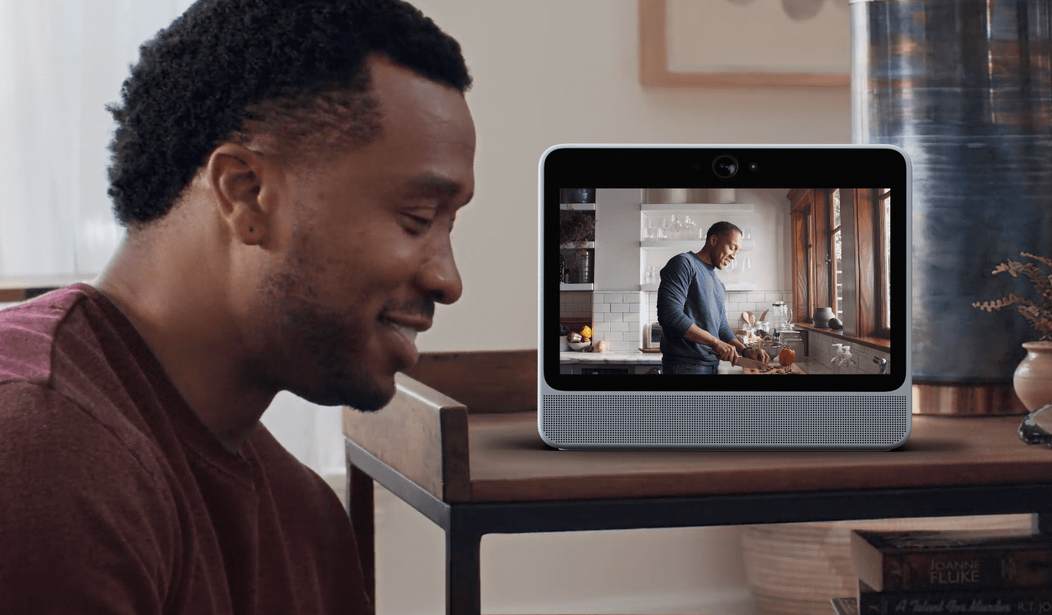Last week Facebook announced two new hardware products, called Portal and Portal+. They’re not the company’s first hardware products; that honor belongs to their ill-fated attempt in 2013 to create a Facebook phone. But these are the most visible and important additions to Facebook’s recently ramped-up hardware efforts.
Facebook’s new Portal products are home speakers with built-in video screens that are voice activated, much like the Amazon Alexa, whose technology they use. The built-in video screen adds the capability of video calling using their Messenger service. Like Alexa, each can also be used to stream music as well as respond to thousands of voice commands.
One of the primary advancements over other home speakers, according to Facebook, is their video phoning capability. The cameras are designed to use artificial intelligence to automatically adjust your face image to the correct size, regardless of how far away you are from the screen, and to track you by rotating the camera from side to side. The deluxe 15.6-inch Portal+ costs $349 and the 10-inch display Portal costs $199. Each requires that the camera and microphone be turned on to be used.
The reaction from most reviewers to this product announcement was almost universally negative, with most wondering why anyone would trust Facebook and allow them to put microphones and video cameras in their homes, considering the company’s history of ignoring personal privacy, freely using people’s personal information, and their inability to prevent that data from reaching the wrong people.
Typical was the reaction of USA Today’s tech columnist Ed Baig:
Hell, no! That’s the blunt response I got from a colleague, moments after I started to tell her about Facebook’s Portal and Portal+, the new voice-controlled, video-calling devices with Amazon’s Alexa that Facebook starts taking pre-orders for on Monday. As in hell, no, I’m not buying. Another colleague was equally skeptical: “Why would I let Facebook have an internet-connected camera in my home?” he asked.
But as bad as this is, it just got worse.
When Facebook announced these new products, their executives took special care to address this privacy concern and told reporters that no data would be collected through these new Portal products, including phone calls and other information about their users.
But today, less than a week later, Facebook reneged on this assurance and now says that they will collect users’ information, including calling information, and use that information to send ads to users on other Facebook apps.
Recode reported that they were told by a Facebook spokesman:
Portal voice calling is built on the Messenger infrastructure, so when you make a video call on Portal, we collect the same types of information (i.e. usage data such as length of calls, frequency of calls) that we collect on other Messenger-enabled devices. We may use this information to inform the ads we show you across our platforms. Other general usage data, such as aggregate usage of apps, etc., may also feed into the information that we use to serve ads.
Anyone with any common sense would be very leery of Facebook putting a mic and camera in their home because this company, more than any other, has indiscriminately violated their assurances of protecting personal information. Just in the past month they exposed 30 to 90 million users’ personal data in a data breach and they admitted that they are harvesting the contents of Facebook users’ address books to build up a database of non-Facebook users in order to target them. And in 2016 they violated their agreements with users, disclosing the records of 87 million users to Cambridge Analytica.
But somehow Facebook seems to think they can convince (or fool) customers and get them to disclose even more personal data. Today it’s phone call information. Will it be the entire phone conversations tomorrow? What these products are clearly designed to do is put two of the most onerous methods of gathering personal data in our homes: an always-on microphone and an always-on video camera.
Facebook’s promise last week that these new Portal products would be “private by design” has just fallen by the wayside, before the products have even shipped.









Join the conversation as a VIP Member